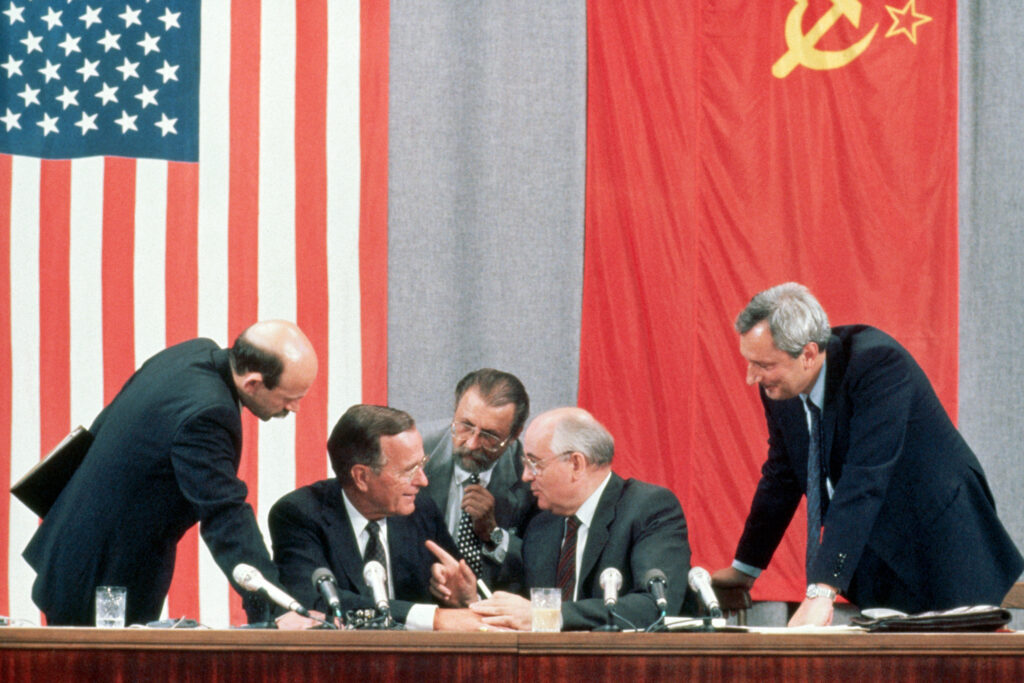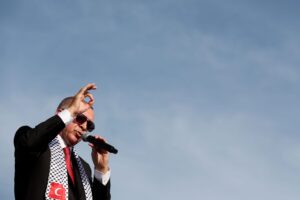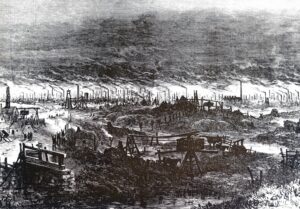Two Wests and Two Anti-Wests

Translated from the Russian by: LB
In the worldview of today’s political elite in Russia—Putin and his inner circle—”anti-Westernism” and “anti-Americanism” are closely related but not identical concepts. To see this, look at the way in which “the West” is used in political and public language in Russia. Close examination reveals that there are, in fact, two Wests, each very different from the other. The first West threatens Russia, retards its development, imposes its will on other countries. This West is the direct heir of the colonialists and imperialists. The second West, meanwhile, is in decline, mired in hyper-tolerance and political correctness, gender and sexual deviance, lacking the capacity to make and enforce decisions. This is the degenerate West, losing its identity to the endless influx of migrants.
In the first West, the United States plays the leading role, to which Europe is attached as a mere partner in crime. In the second West, Europe is foregrounded, casting its perverted glow of decadence onto the United States.
These are Rome and Babylon. But however different they are, America-Rome and Europe-Babylon are not opposed to each other. Rather, they form a dynamic unity: the West proper. Unity implies that every Rome will eventually become a Babylon. And although America-Rome is for now the greater power, its unification with Europe-Babylon means that the current decline of Europe will also—one day—bring down the United States. Even in Putin’s speeches we hear that the weakness of Europe is a comment on the status quo, while the collapse of the US is a prediction of the future.
The expectation of the decline of the West and the end of the “American era” resonates not only with the Russian elite, but also the elites of many “middle powers” and countries of the Global South. The difference lies in how powerfully the idea is held, and in the pragmatics of their own goal-setting. Most countries of this type are armed with a moderate developmentalist approach to anti-Westernism and anti-Americanism. This strategy implies a refusal to copy Western institutions, especially in the political sphere, an indifference or moderate hostility to Western liberal values; limited, pragmatic interaction with the US in the sphere of global politics; yet intensive engagement in the spheres of the economy and technology. This strategy implies a symbiosis, but not an alliance, with the West and its outpost—America—which allows one to wait patiently for the decline of the West, while taking advantage of the opportunities offered by collaborating with it.
In contrast to this relatively sober view, Putin and his inner circle cling to a far more radical version of anti-Westernism and anti-Americanism. This version sees America and the West as a profound existential threat, one with which Russia is in a state of “hybrid war” and ongoing enmity. This leads to a higher level of mutual isolation and a refusal to engage—including in the economic sphere. Not many countries embrace this kind of radical anti-Westernism: only Russia, North Korea, and Iran. Unlike the pragmatic developmentalist anti-Westernism focused on the benefits of economic exchange, these regimes forcefully ideologize their anti-Americanism; they turn it into a tool of domestic politics and their own legitimation. And they pay the price by limiting themselves the benefits that come with economic cooperation and development.
Media mobilization: How attitudes toward America have deteriorated over time
If we deploy sociological data regarding the history of Russian attitudes toward the United States in the post-Soviet period, two things stand out. First, as is often the case with foreign policy, Russian citizens’ perceptions of the United States were mostly provoked by concrete events, in which the media, adding fuel to the Kremlin’s own fiery rhetoric, inspires a kind of anti-American mobilization in public opinion. Each instance provokes a sharp spike in ill-will, but as soon as the media moment passes, a generally positive attitude toward the United States is restored. At the same time—and this is the second basic observation—following each crisis, favorable attitudes start to progressively diminish. In other words, an anti-American sensibility slowly but methodically develops through a series of short-lived information crises. The toothpaste can never really get back in the tube.
In the early 1990s, according to Levada Center polling, roughly 75% of Russians had a positive attitude toward the United States, 7–8% a negative attitude, and about 20% found it difficult to clarify a position. By the end of the 1990s, the numbers turned slightly lower: 70% positive versus 20% negative. Then came the US-led NATO bombing of Yugoslavia. As a result, in the spring of 1999, a mere third of respondents (32%) had a favorable attitude toward the US, while more than half (52%) now had a negative one; the ratio had become negative for the first time. Yet just a few months later, in early 2000, a positive majority was restored, and until 2003 the margin settled at 63% positive against 25% negative.
Then arrived the annus horribilis of 2003 and a new reason for resentment against America: the Iraq war. General favorability toward the US turned negative once more in March-April 2003 (38% vs. 55%). But, as in the past, by year’s end a positive balance was restored and until the beginning of 2006 it stayed at the level of 60% positive against 32% negative.
In the Spring of 2006 the Vilnius Conference was held and attended by Russia’s western neighbors Estonia, Ukraine, Romania under US auspices. The US Vice President Dick Cheney delivered a searing speech that decried Russia’s aspirations to dominate the post-Soviet space and instantly triggered a new crisis. The Kremlin saw the conference as an attempt to create an “anti-Russian coalition” along its western borders. It was not the only crisis of the period between 2006 and 2008: US plans to deploy a missile defense system in Eastern Europe; the NATO summit in Bucharest, which announced a plan for Georgia and Ukraine to join the alliance; the war in Georgia; and the beginning of the global financial crisis.
The financial crisis of 2008, confronted Putin with the first economic shock of his presidency. Before 2008, his terms in office looked to ordinary Russians as a kind of economic miracle, with steady economic growth of 7% per annum after more than a decade of deep recession. In the first half of 2008, the president and his entourage were entranced by the ideas around “decoupling.” According to decoupling theory, extremely low growth rates and crises in developed countries would, for the foreseeable future, coexist with rapid growth rates in developing countries. The severe disappointment that befell the theory’s proponents later that same year led to accusations that America was “infecting” the world economy.
In reality, however, the spectacular 7% contraction of Russian GDP in 2009 was largely the result of falling oil prices. The US was blamed because a period of ultra-low interest rates led to an inadequate rise in oil prices, which had hugely benefited Putin and Russia. But such an interpretation of Putin’s “economic miracle” would be a blow to his image as a savior of Russia, so the state media spared no effort to blame the US for the crisis. At this point, Putin’s entourage was beginning to see the US economy as plagued by irrecoverable imbalances and it only avoided collapse thanks to the country’s political and military capacities (this view was partly reflected in Russia’s new foreign policy concept adopted in 2013).
By the end of 2008, polls were showing that 31% of Russians had a favorable view of the US, while 56% did not. This ratio was worse than it was during the Iraq War (and at any moment prior to that). However, yet again, as the economy recovered, a positive balance was also restored and held at 55% positive versus 32% negative from 2010 until the second half of 2013. From then on a series of developments: the Euromaidan protests, the annexation of Crimea, sanctions, and the war in eastern Ukraine initiated by Russian sabotage units – all of which firmly sank the approval ratings for the US. However, if in 2014–2016 the ratio of positive to negative approval of the US was, respectively, 20% to 70% in the polls, by 2019–2021 it returned to a near zero balance of 40% vs. 45%.
The logic of frustration
This oscillating dynamic points to the role played by information campaigns “from above” with its often steady drumbeat of anti-Americanism. However, it also points to a parallel process: the strengthening of an anti-Americanism associated with a reassessment of the West in general and America as its power center.
To get a sense of the internal drama, we need to focus on the super-high approval ratings of the United States in the early 1990s. In historical perspective and in the understanding of the American establishment of that time, the collapse of the Soviet Union was clear evidence of America’s triumph in the Cold War. This collapse appeared to be a repetition of what befell the Russian Empire at the beginning of the twentieth century as a result of its defeat in World War I. At the same time, Russians themselves scarcely perceived the end of the Cold War as a defeat inflicted by the US. Rather it was interpreted as Russia’s successful pivot to avoid defeat by switching to the winning side. Unlike the situation in the US, Russians still viewed the US as a close partner.
Subsequent disappointment (characteristic not only of Russia) might be described as a switch from Fukuyama’s thesis that with the fall of communism there was no alternative to the “Western model,” to the increasingly clear realization that to borrow, adapt and reproduce this model was (contrary to initial expectations) a task of a completely different order of complexity (or simply impossible).
As a result, a considerable segment of public opinion—both elite and mass—began to strengthen, which saw in the West’s cynical invitation to “switch to the winning side” not a way out, but a deceptive trap. This shift took place in Russia over the first decade of the 21st century. Putin’s notorious statements from that time reflect the strategic ambiguity in the US vision. When Putin said that Russia was ready to consider joining NATO but not welcome there, it can be seen as a rhetorical ploy by a former KGB officer. But in general these words correspond to the self-perception of the average citizen of an “incomplete transit” country.
To a large extent, Russia adopted a post-colonial lens towards the United States, viewing America as a selfish hegemon whose policies could be challenged as much as they could be loved: not at all. Concomitantly, a perception was developing that in the context of borrowing market economy experience and practices from the West and from America and expanding trade and economic ties, one should avoid borrowing their political institutions and system of “values” since they are are “unsuitable” for the rest of the world (and are regardless more of a management tool that the American elite skillfully uses in its own interests).
Great Powers: Between liberal and anti-liberal empires
The paradox of US-Russian relations is that both nations’ perceptions of their statehood were shaped by the long Cold War confrontation. This is when the American view of its global and international mission took shape. However, for several generations of Russians, this period is remembered as a time when Russia’s foreign policy power and prestige reached its zenith.
These perceptions have consequences more lasting and profound than one might imagine. In both cases, great power status and the perception of a particular mission are compensation for a weak or absent ethnic nationalism, which cedes to a kind of “state nationalism” the role of cementing national unity.
The singular importance of “great power” status for Russians seems to be determined by this internal need. The historical experience of two empires—Russian and Soviet—prevents Russians of conceiving of themselves as a nation-state, but as something greater. This understanding of statehood need not necessarily be imperialist or expansionist. On the contrary, throughout the post-Soviet period, only about 20-25% of the population has been in favor of annexing external territories to Russia, even peacefully. This thirst for great power status is more a factor of national identity rather than belligerent expansionism.
However, it largely determines Russians’ approach to America, which for Russians is located somewhere between “imitation” and “confrontation.” It is no coincidence that one of the architects of the 1990s Russian reforms, Anatoly Chubais, proposed at the beginning of this century the concept of Russia as a “liberal empire,” which was supposed to compete with the “anti-liberal empire” concept slowly taking shape at that moment, and which Vladimir Putin would actualize.
Chubais’s idea had little chance of being realized, not only for domestic reasons. While America was losing its status as an “institutional model” in Russia, America itself, after the shock of 9/11, shifted its own strategy from “soft power” to “hard power”. Among those positive connotations of America by Russians in the early 2000s, the definition of America as a “rich country” was noted by 60% of respondents, a “strong military power” by 50%, its definition as a democracy by 19%, and as a leader of the world’s “scientific and technological progress” by 17%. We do not have similar data from the early 1990s, but there is little doubt that democracy and progress would have been much more prominent at that time.
The importance of “soft power” has rapidly diminished in the eyes of Russians themselves. In answering the 2002 question: “Which three countries can be considered to be great? 62% mentioned the United States, 43% Russia, and 37% Japan (only 19% said China). In 2016, the numbers looked like this: 64% mentioned Russia, 48% mentioned China, and 46% mentioned the US. The most telling thing here is probably not even the displacement of the US and China on the “greatness” scale, but the disappearance of Japan altogether from the list (it is now recognized as a great country by only 17%).
Japan’s third place in the first list and marginal place in the second indicates how much more important economic success was for Russian respondents in the early 2000s. Moreover, the “Japanese miracle” in the eyes of Russians was characterized by the fact that economic success was presented not as the success of the government, but as the success of corporations. In contrast, the rise of China in the list of greatness by the mid-2010s indicates a paradigm shift in the notion of greatness: now it is represented to a much greater extent as a “strong government” capable of ensuring national unity in moving toward a common goal. The “miracle” has moved across the East China Sea from Japan to China, but whereas in the Japanese version it was an economic miracle, unassociated with the government, now it appears precisely as the promising unity of a strong government and a strong economy.
The shift in the “greatness” paradigm has become a global phenomenon, particularly motivated by the victory of Donald Trump in the 2016 presidential election, who led the intra-American campaign against political “liberalism”. At the same time, this victory became in the eyes of the world not a demonstration of “national will,” but, on the contrary, a demonstration of polarization and division, which suddenly calls into question another pillar of American greatness: the indestructibility of American democracy.
It should be noted, however, that having lost its appeal as an “institutional model” and as a flagship of “soft power”—having in many ways after 2008 lost the status of unrivaled economic power (it no longer appeared quite reliable to the world)—in one area the US has retained its status of undisputed leadership: civilian technological innovation. Apple, Google, and Facebook remain ambassadors for American superiority and forward-thinking. What is significant here is both the fact that these innovations were associated with corporations rather than the state, and that they appear to be centered in the field of communications. The growing skepticism about the “American model” did not sully the atmosphere of technological adoration created by Apple. Today the vortex of confrontations both inside the United States and on the international arena is increasingly pulling these islands of soft power into its orbit, and Elon Musk is decisively transforming the image of the innovative entrepreneur, turning him into an energetic mouthpiece of ideological confrontation and division.
Putin’s radical anti-Westernism and anti-Americanism implanted continues to strike one as a deviation, an anomaly, in the recent history of Russia. Yet against the backdrop of America’s greatness being called into question from all quarters, not to mention the shift in the understanding of “greatness” in the United States itself, Russia’s animus does begin to make sense.
Kirill Rogov is well-known expert on Russian politics and the economy, who left the country following the full-scale invasion, is living in Vienna, and has launched Re: Russia—Expertise, Analysis and Policy Network, providing in-depth analysis of Russian politics and economic development.


